-
 Wu appointed associate director for Precision Surgery and associate professor in the Department of UrologyDec 02, 2025The Department of Urology is pleased to announce the appointment of Chen-Han Wilfred Wu, M.D., Ph.D., to the faculty at the rank of associate professor. Wu also serves as associate director for Precision Surgery in the Hugh Kaul Precision Medicine Institute.
Wu appointed associate director for Precision Surgery and associate professor in the Department of UrologyDec 02, 2025The Department of Urology is pleased to announce the appointment of Chen-Han Wilfred Wu, M.D., Ph.D., to the faculty at the rank of associate professor. Wu also serves as associate director for Precision Surgery in the Hugh Kaul Precision Medicine Institute. -
 Might to deliver distinguished lecture at the world’s largest genetics meetingOct 06, 2025Matt Might, Ph.D., professor in the Department of Medicine and director of the Hugh Kaul Precision Medicine Institute (PMI), has been selected to deliver a distinguished lecture at the American Society of Human Genetics Annual Meeting this October in Boston.
Might to deliver distinguished lecture at the world’s largest genetics meetingOct 06, 2025Matt Might, Ph.D., professor in the Department of Medicine and director of the Hugh Kaul Precision Medicine Institute (PMI), has been selected to deliver a distinguished lecture at the American Society of Human Genetics Annual Meeting this October in Boston. -
 How PMI’s SUPREME program prepares medical students for the frontlines of rare disease careAug 07, 2025The UAB Precision Medicine Institute’s SUmmer in PREcision MEdicine (SUPREME) program is an immersive eight-week program that prepares medical students to navigate the uncertainties of rare diseases. Learn more from the most recent SUPREME cohort as they reflect on their journeys.
How PMI’s SUPREME program prepares medical students for the frontlines of rare disease careAug 07, 2025The UAB Precision Medicine Institute’s SUmmer in PREcision MEdicine (SUPREME) program is an immersive eight-week program that prepares medical students to navigate the uncertainties of rare diseases. Learn more from the most recent SUPREME cohort as they reflect on their journeys. -
 UAB M.D.-Ph.D. student finds mentorship and meaning through Hugh Kaul Precision Medicine InstituteAug 01, 2025Michael Patton, Ph.D., a student in Heersink’s Medical Scientist Training Program (MSTP), recently defended his doctoral dissertation, an achievement that moves him one step closer to becoming a physician-scientist. His work with the Hugh Kaul Precision Medicine Institute (PMI), under the mentorship of Matt Might, Ph.D., director for PMI, and William Byrd, Ph.D., associate director for PMI, played a central role in his Ph.D. journey.
UAB M.D.-Ph.D. student finds mentorship and meaning through Hugh Kaul Precision Medicine InstituteAug 01, 2025Michael Patton, Ph.D., a student in Heersink’s Medical Scientist Training Program (MSTP), recently defended his doctoral dissertation, an achievement that moves him one step closer to becoming a physician-scientist. His work with the Hugh Kaul Precision Medicine Institute (PMI), under the mentorship of Matt Might, Ph.D., director for PMI, and William Byrd, Ph.D., associate director for PMI, played a central role in his Ph.D. journey. -
 UAB Hugh Kaul Precision Medicine Institute helps family turn diagnosis into global advocacyMay 12, 2025For one family, a difficult genetic diagnosis sparked a mission. With help from the University of Alabama at Birmingham (UAB) Hugh Kaul Precision Medicine Institute (PMI), they’re now turning their journey into hope for families worldwide.
UAB Hugh Kaul Precision Medicine Institute helps family turn diagnosis into global advocacyMay 12, 2025For one family, a difficult genetic diagnosis sparked a mission. With help from the University of Alabama at Birmingham (UAB) Hugh Kaul Precision Medicine Institute (PMI), they’re now turning their journey into hope for families worldwide. -
 Building the FutureJan 27, 2025The UAB campus is rapidly being reimagined through numerous new construction and building renovation projects. These include projects that directly support the goals of UAB’s Forging Ahead strategic plan and Research Strategic Initiative: Growth with Purpose, which set a goal of increasing research expenditures to $1 billion, from $774.5 million in fiscal year 2023. Several projects also advance the Heersink School of Medicine’s strategic goals across its mission pillars in clinical care, medical education, and biomedical research.
Building the FutureJan 27, 2025The UAB campus is rapidly being reimagined through numerous new construction and building renovation projects. These include projects that directly support the goals of UAB’s Forging Ahead strategic plan and Research Strategic Initiative: Growth with Purpose, which set a goal of increasing research expenditures to $1 billion, from $774.5 million in fiscal year 2023. Several projects also advance the Heersink School of Medicine’s strategic goals across its mission pillars in clinical care, medical education, and biomedical research. -
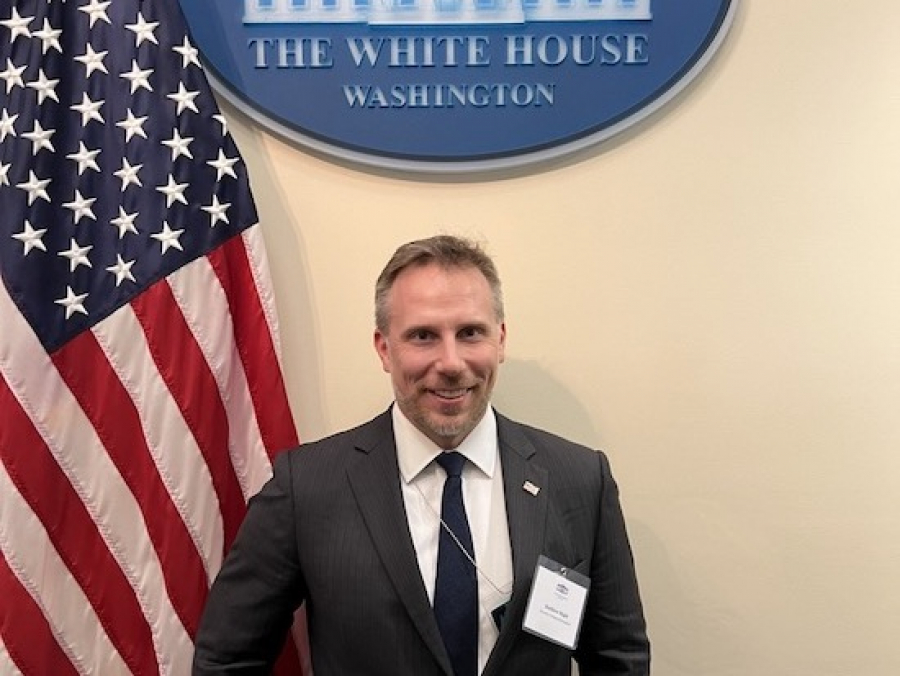 Hugh Kaul Precision Medicine Institute team plays key collaboration role in an up to $48 million ARPA-H contractNov 04, 2024The Hugh Kaul Precision Medicine Institute (PMI) team has partnered with Every Cure on a groundbreaking project to build a large drug-repurposing database. The project, called ML/AI-enabled Therapeutic Repurposing In eXtended uses (MATRIX), received a contract from the Advanced Research Projects Agency for Health (ARPA-H) for up to $48 million, announced earlier this year at a White House event.
Hugh Kaul Precision Medicine Institute team plays key collaboration role in an up to $48 million ARPA-H contractNov 04, 2024The Hugh Kaul Precision Medicine Institute (PMI) team has partnered with Every Cure on a groundbreaking project to build a large drug-repurposing database. The project, called ML/AI-enabled Therapeutic Repurposing In eXtended uses (MATRIX), received a contract from the Advanced Research Projects Agency for Health (ARPA-H) for up to $48 million, announced earlier this year at a White House event. -
 Nine Heersink staff members honored with 2024 Dean’s Excellence Awards for StaffSep 11, 2024Heersink School of Medicine awarded nine staff members as the 2024 Dean’s Excellence Awards for Staff winners. Individuals selected for this honor showcased outstanding accomplishments beyond their daily duties and contributed considerably to Heersink’s core mission areas – education, clinical care, and basic, translational, and clinical research.
Nine Heersink staff members honored with 2024 Dean’s Excellence Awards for StaffSep 11, 2024Heersink School of Medicine awarded nine staff members as the 2024 Dean’s Excellence Awards for Staff winners. Individuals selected for this honor showcased outstanding accomplishments beyond their daily duties and contributed considerably to Heersink’s core mission areas – education, clinical care, and basic, translational, and clinical research. -
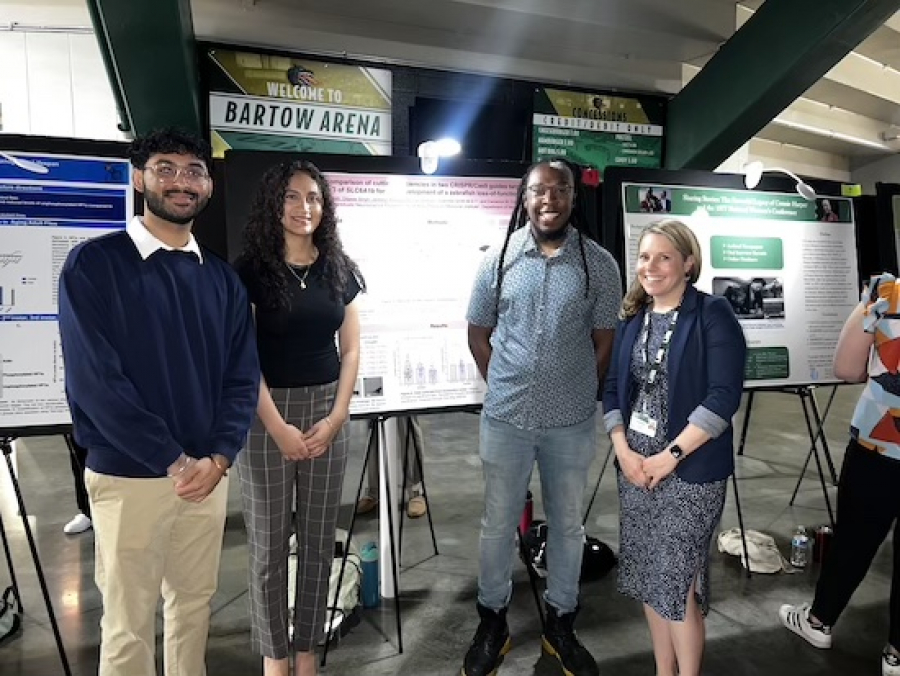 Research in the classroom: Students conduct precision medicine research that benefits patients with neurological diseases through Undergraduate Neurosciences Program coursesSep 04, 2024Camerron Crowder, Ph.D., assistant professor in the UAB Department of Neurobiology and assistant director of the Hugh Kaul Precision Medicine Institute (PMI), offers a unique research opportunity for undergraduate students by teaching the PMI research process, how to develop animal models, and the use of artificial intelligence to identify treatment options through courses in the Undergraduate Neuroscience Program.
Research in the classroom: Students conduct precision medicine research that benefits patients with neurological diseases through Undergraduate Neurosciences Program coursesSep 04, 2024Camerron Crowder, Ph.D., assistant professor in the UAB Department of Neurobiology and assistant director of the Hugh Kaul Precision Medicine Institute (PMI), offers a unique research opportunity for undergraduate students by teaching the PMI research process, how to develop animal models, and the use of artificial intelligence to identify treatment options through courses in the Undergraduate Neuroscience Program. -
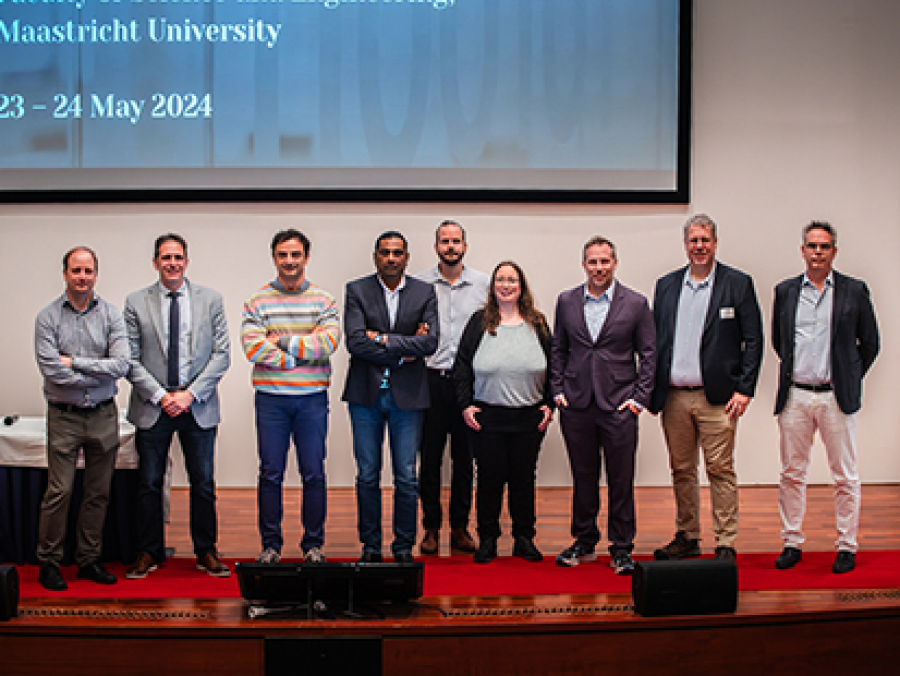 Heersink Institute Leadership Attend Symposium on AI in Health Care at Maastricht UniversityJul 03, 2024University of Alabama at Birmingham (UAB) faculty members recently participated in the AI in Medicine and Healthcare Symposium at Maastricht University, which brought together experts and stakeholders to discuss the role of artificial intelligence (AI) in transforming health care.
Heersink Institute Leadership Attend Symposium on AI in Health Care at Maastricht UniversityJul 03, 2024University of Alabama at Birmingham (UAB) faculty members recently participated in the AI in Medicine and Healthcare Symposium at Maastricht University, which brought together experts and stakeholders to discuss the role of artificial intelligence (AI) in transforming health care. -
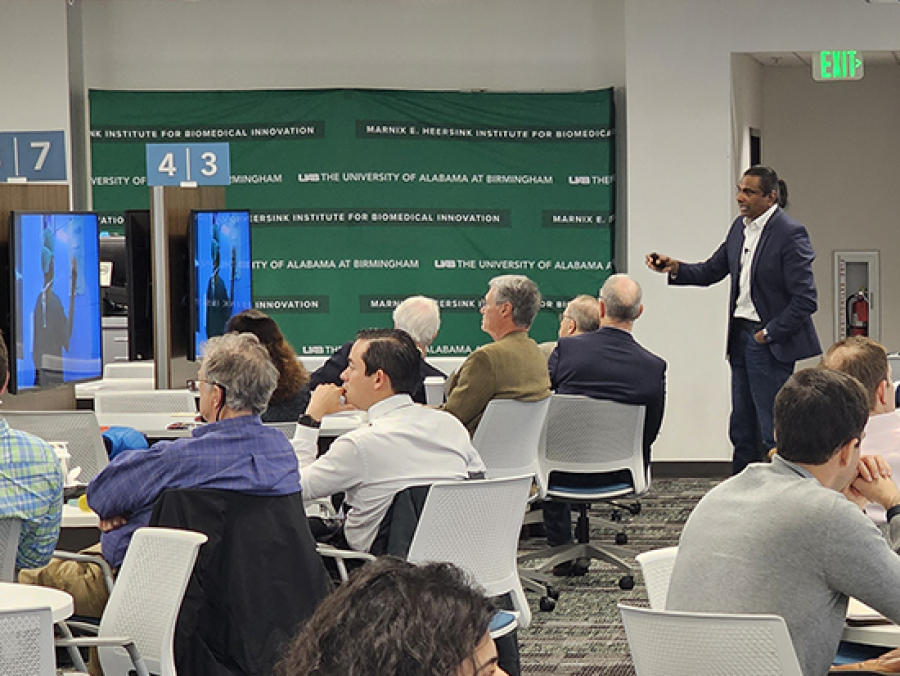 Heersink School of Medicine hosts ACP Alabama Chapter Winter Meeting on AI in medicineMar 08, 2024The American College of Physicians Alabama Chapter recently held its annual Winter Meeting at UAB’s new Active Learning Center in Volker Hall. The meeting, hosted by the UAB Marnix E. Heersink School of Medicine, focused on “Medicine in the Machine Age: The Integration and Influence of AI in Medicine,” and featured presentations and expert involvement from the Marnix E. Heersink Institute for Biomedical Innovation team and other Heersink School of Medicine leaders.
Heersink School of Medicine hosts ACP Alabama Chapter Winter Meeting on AI in medicineMar 08, 2024The American College of Physicians Alabama Chapter recently held its annual Winter Meeting at UAB’s new Active Learning Center in Volker Hall. The meeting, hosted by the UAB Marnix E. Heersink School of Medicine, focused on “Medicine in the Machine Age: The Integration and Influence of AI in Medicine,” and featured presentations and expert involvement from the Marnix E. Heersink Institute for Biomedical Innovation team and other Heersink School of Medicine leaders. -
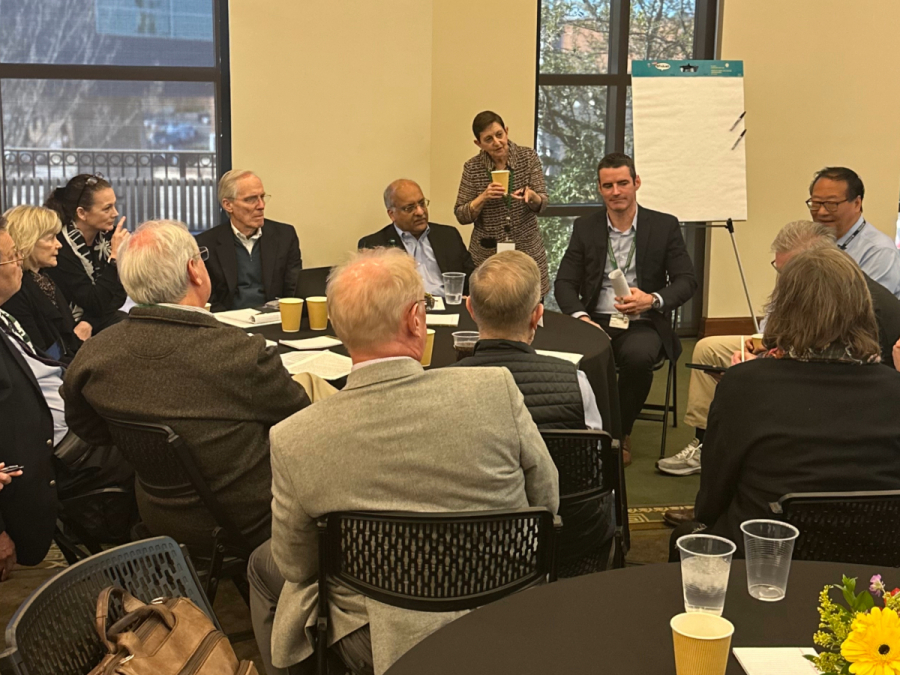 Office of Research reviews a year of progress at the 2024 Annual Research RetreatFeb 21, 2024The Heersink School of Medicine Office of Research held its Annual Research Retreat on Tuesday, Feb. 6, at the UAB Alumni House. Research leadership from across Heersink, UAB Central Administration, other UAB schools, and Southern Research attended the retreat.
Office of Research reviews a year of progress at the 2024 Annual Research RetreatFeb 21, 2024The Heersink School of Medicine Office of Research held its Annual Research Retreat on Tuesday, Feb. 6, at the UAB Alumni House. Research leadership from across Heersink, UAB Central Administration, other UAB schools, and Southern Research attended the retreat. -
 Patton receives NEJM scholarship for SAILOct 19, 2023Michael Patton, an M.D.-Ph.D. student at the Heersink School of Medicine, received the 2023 New England Journal of Medicine scholarship for the Symposium on Artificial Intelligence for Learning Health Systems (SAIL) and gave a Spotlight Talk at the conference.
Patton receives NEJM scholarship for SAILOct 19, 2023Michael Patton, an M.D.-Ph.D. student at the Heersink School of Medicine, received the 2023 New England Journal of Medicine scholarship for the Symposium on Artificial Intelligence for Learning Health Systems (SAIL) and gave a Spotlight Talk at the conference. -
 Marnix E. Heersink Institute for Biomedical Innovation hosts Generative AI for Healthcare SymposiumSep 25, 2023The Marnix E. Heersink Institute for Biomedical Innovation held a symposium titled "Generative AI for Healthcare: Progress or Peril" with multiple speakers, all innovators in the field of health care, on Tuesday, Sept. 12.
Marnix E. Heersink Institute for Biomedical Innovation hosts Generative AI for Healthcare SymposiumSep 25, 2023The Marnix E. Heersink Institute for Biomedical Innovation held a symposium titled "Generative AI for Healthcare: Progress or Peril" with multiple speakers, all innovators in the field of health care, on Tuesday, Sept. 12. -
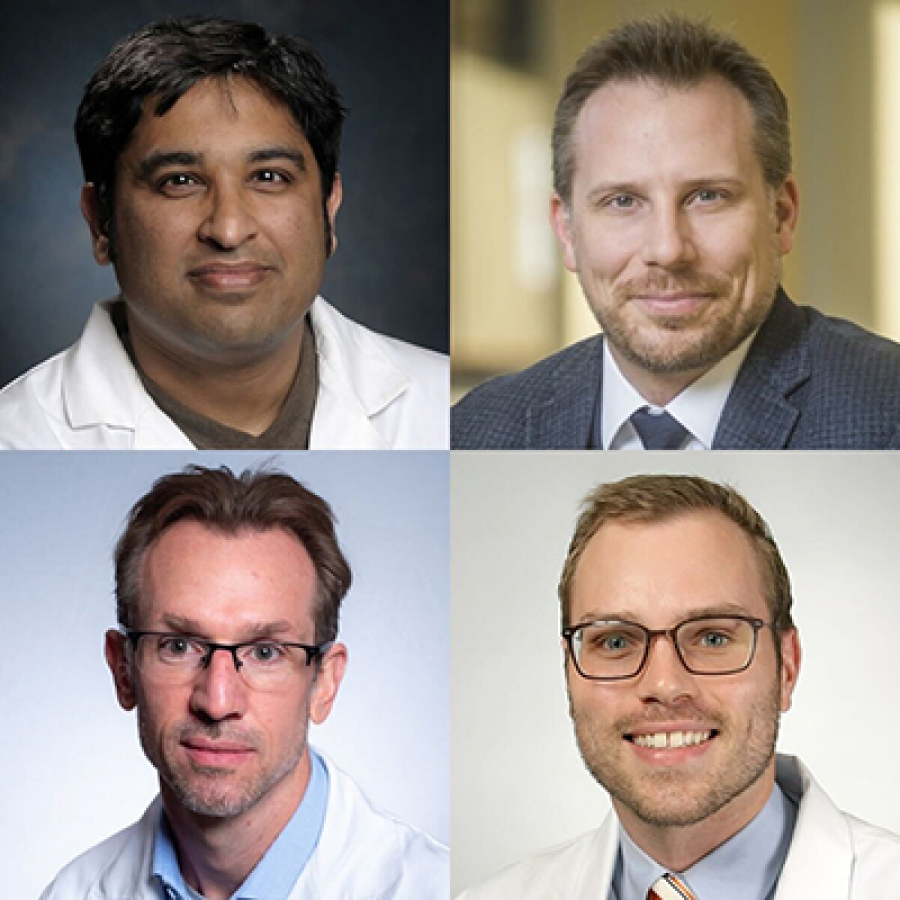 COVID-19 bacteremic co-infection is a major risk factor for mortality, ICU admission, and mechanical ventilationJul 05, 2023Nathaniel Erdmann, M.D., Ph.D., Amit Gaggar, M.D., and Matthew Might, Ph.D., are the latest winners of the Heersink School of Medicine's Featured Discovery. This initiative celebrates important research from Heersink faculty members.
COVID-19 bacteremic co-infection is a major risk factor for mortality, ICU admission, and mechanical ventilationJul 05, 2023Nathaniel Erdmann, M.D., Ph.D., Amit Gaggar, M.D., and Matthew Might, Ph.D., are the latest winners of the Heersink School of Medicine's Featured Discovery. This initiative celebrates important research from Heersink faculty members. -
